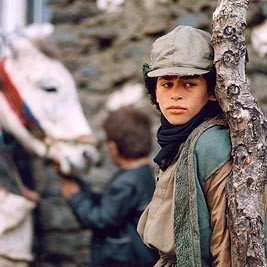
I remember the Kurdish area on the Iran/Iraq border as a land of stunning beauty and inordinate risk. No movie captures both realities better than A Time for Drunken Horses. Made by then-unknown Iranian director Bahman Ghobadi in 2000, it’s the first widely-released film in the Kurdish language, one of many virtues that help it bring alive this part of the world in an authentic way.
The Kurdish villagers (most of whom Ghobadi had play themselves on screen) eke out an existence by smuggling goods back and forth across the snowy, mountainous border. In addition to avoiding border guards who mete out lethal summary punishments, the smugglers must also scramble to evade armed bandits who raid their caravans. Crushing poverty is the lot even of those smugglers who succeed, but they are too economically desperate to abandon their dangerous business. The film’s plot centers on an orphaned family led by a heroic 12-year old boy named Ayoub. He provides for his siblings by smuggling, but his profits are too small to save his deformed, pained, and ill brother Medi. Though an operation will only extend rather than save Medi’s life, Ayoub takes on increasingly dangerous work out of love for his sickly brother.
This is an achingly sad film that tells a painful story in an unsparing fashion (Analogies to Vittorio De Sica’s Bicycle Thieves are inevitable and accurate). But it’s watchable because of the astonishing performances of the young actors and the inspirational courage and love of the family upon whom the story centers. As a director, Ghobadi is wise enough to never descend into mawkishness or to idealize the moral character of the poor, some of whom are portrayed here as greedy and conniving. Nor does he make the mistake of some films of this sort by lecturing the audience (e.g., by having some character deliver an earnest speech about the callousness of wealthy Westerners). Rather, he lets the audience feel their own emotions and draw their own conclusions about the characters’ bleak lives.

Saed Nikzat’s cinematography captures the harsh gorgeousness of the region. Nitzat also, wonderfully, lets the camera linger in extended shots so that viewers can immerse themselves in the events portrayed rather than have their attention jerked around by constant jump cuts and close ups. The camerawork makes watching this film at times feels like a melancholy form of meditation.
A Time for Drunken Horses is a powerful piece of cinematic art that deservedly raised the profile of Iranian film worldwide. It will not make you happy, but it will stay with you in a way that is precious beyond words.
